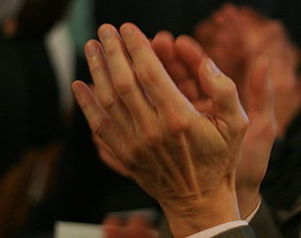by Kristin Fontaine
Magrat’s arm tingled as the power flowed up it.*
Granny’s broomstick jerked forward.
“Leave me a bit,” shouted Magrat. “I’ve got to get down!”
“Shouldn’t be difficult,” screamed Granny, above the noise of the wind.
“I mean get down safely!”
“You’re a witch, ain’t you? By the way, did you bring the cocoa? I’m freezing up here!”
Magrat nodded desperately, and with her spare hand passed up a straw bag.
“Right,” said Granny. “Well done. See you at Lancre Bridge.”
She uncurled her fingers.
Magrat whirled away in the buffeting wind, clinging tightly to a broomstick which now, she feared, had about as much buoyancy as a bit of firewood. It certainly wasn’t capable of sustaining a full-grown woman against the beckoning fingers of gravity.
As she plunged down toward the forest roof in a long shallow dive she reflected that there was possibly something complimentary in the way Granny Weatherwax resolutely refused to consider other people’s problems. It implied that, in her considerable opinion, they were quite capable of sorting them out by themselves.
Some kind of Change spell was probably in order.
Magrat concentrated.
Well, that seemed to work.
Nothing in the sight of mortal man had in fact changed.
What Magrat had achieved was a mere adjustment of the mental processes, from a bewildered and slightly frightened woman gliding inexorably toward the inhospitable ground to a clearheaded, optimistic and positive thinking woman who had really got it together, was taking full responsibility for her own life and in general knew where she was coming from although, unfortunately, where she was heading had not changed in any way. But she felt a lot better about it.
~Terry Pratchett, Wyrd Sisters
The above quote from Terry Pratchett’s novel “Wyrd Sisters” is the best description of prayer that I have ever read.
I have never believed in the slot machine version of prayer; where you put your request in the slot and either hit the jackpot or wind up with two lemons and a banana. Belief in a slot machine god leads to things like the prosperity gospel. It also leads to trying to fit God into the box created by our own desires and shaving off the bits of God that don’t fit.
No matter how tenuous my relationship with the physical church has been I have never lost the impulse to turn to God in prayer. However that impulse is tempered by two contrasting ideas.
One comes from a mis-hearing of the words of a hymn. For years I thought the hymn “There’s a wideness in God’s mercy” by Frederick William Faber was “There’s a wildness in God’s mercy” this corresponded so well with the image of God conjured up in C.S. Lewis’s “Narnia” books (“Not a tame lion” is something said by many of the creatures that Lucy meets when they describe Aslan to her) that it was only in the last year when my mom heard me singing it, that I learned what the words really were. I still like my own mis-heard version better.
The other comes from my understanding of free will and that God has given us all that we need to make heaven on earth. We just make bad choices as a species. A tongue-in-cheek encapsulation of my thoughts on free will and tension between wanting to talk to God, but feeling like I should also just be getting on with my work in the world is embedded in the lyrics of Andrew Ratshin’s song “Just One Angel”.
Why would we have free will
if he thought we’d always call
Maybe its a lack of sleep
that keeps him feeling vengeful
Mabye he’d be sweet and soft
If he could have his Sunday’s off
~Andrew Ratshin, “Just one Angel”
Even with these contradictory feelings about when I should pray and what the result of that prayer might be, I come back to it more than any other spiritual discipline. Sometimes my prayers a filled with rage and loss, sometimes with unbearable joy, when my heart is full it spills out in prayer.
Like tears, prayer ends leaving me feeling both spent and calm. Prayer gives me a quiet place in the universe to pull back from the storm of the moment and put what is happening in perspective. Like Magrat, from the outside, there is no change to my aspect or circumstances after prayer. What there is, is a change in my own mental landscape.
One sees clearly only with the heart. What is essential is invisible to the eyes.
~ Antoine de Saint-Exupéry, “The Little Prince”
Prayer is fundamentally a way for me to look at myself and my actions in the world. It is a place where I can remind myself to strive to be the best person I can. When I fall short, when I experience injustice, when suffering touches me or those I love, prayer helps me find my courage and step back into the world, unchanged in all but the most essential ways.
Pratchett, Terry (2009-10-13). Wyrd Sisters: A Novel of Discworld (pp. 168-169). HarperCollins. Kindle Edition.
Faber, Frederick William (1862) “There’s a Wideness in God’s Mercy”
Ratshin, Andrew (2012) “Just one Angel”
de Saint-Exupéry, Antoine (1943) “The Little Prince”
Kristin Fontaine is an itinerant Episcopalian, crafter, hobbyist, and unstoppable organizer of everything. Advent is her favorite season, but she thinks about the meaning of life and her relationship to God year-round. It all spills out in the essays she writes. She and her husband own Dailey Data Group, a statistical consulting company.
Image: By Niklas Bildhauer, Germany. – Own work, CC BY-SA 3.0, Link

